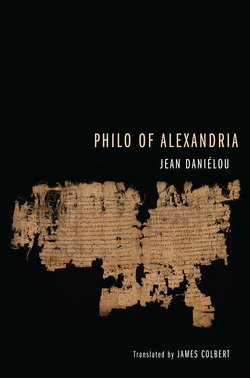Читать книгу Philo of Alexandria - Jean Danielou - Страница 6
Author’s Foreword
ОглавлениеPhilo of Alexandria’s life and work have been the object of a number of studies in recent years, especially in the United States and Germany. This interest is due first to the fascination this strange and complex personality continues to cause, with his combination of faith in the Old Testament and Hellenistic culture. It is also due to Philo’s testimony about the state of Judaism in the period when Christianity appears–and to the rebirth of lively interest in that environment because of the discovery of the Qumran manuscripts.
But it is odd to see how different authors who have recently dealt with Philo give us conflicting pictures. Hartwig Thyen offered a recent balance sheet of these studies.2 First of all, there are disagreements about who the man himself was. Völker takes him for a mystic who abandoned the world.3 Goodenough sees him as an official involved in politics.4 Wolfson regards him as a philosopher preacher.5 The same contradictions appear when Philo’s writings are interpreted. Völker sees a spiritual exegesis of Scripture without particular speculative concern. By contrast, Wolfson considers the endeavor to be a remarkably coherent philosophical system. Goodenough discovers the transformation of Judaism into a mystery cult.6 Jonas detects one of the first forms of Gnosticism.7
Doubt appears especially in the attempt to situate Philo’s fundamental orientation. In the period before 1938, Bréhier,8 Goodenough, and Pascher9 see him as the representative of a syncretistic piety with no more than a Jewish coloring. By contrast, Völker and Wolfson present him as a believing Jew, adopting Hellenistic forms of expression. This was already Heinemann’s position.10 Today it seems that Bultmann, Jonas, and Thyen again lean toward a syncretistic interpretation.
The uncertainty seems to stem from this Alexandrian Jew’s extraordinary subtlety. We will try to show that first. Many studies appear to commit the error of wanting to look at the work without taking the man into account. Give the prominent position of his family, Philo was in contact with and moved quite easily in widely differing environments. We find him celebrating Passover with the Jewish monks of Lake Mareotis, arguing philosophy at the didaskaleion of Potamo, and negotiating with the Roman Governor Flaccus on behalf of the Jewish community of Alexandria.
Understandably, such flexibility makes him difficult to pin down. Yet the overall sense of his life and of the body of his work leaves no room for doubt. He was passionately devoted to the Jewish community and its faith. His whole activity was dedicated to explaining the Bible to the Jews and defending it before the pagans. Such episodes of his life as we know show him at the service of his brethren in Alexandria.
Yet, this Judaism has no Pharisaical rigidity or zealot fanaticism. Philo is imbued with Greek humanism, with everything the term implies not only about culture but also about good breeding. He is one of the most remarkable products of the παιδεία of his time. His subtle allegories release the faith of his fathers from its Semitic shell to wrap it in the most refined contemporary philosophical forms.
Sometimes that may involve our thinker’s showing certain complaisance toward strange doctrines. His enterprise was not risk free. But this Jew of great character and great culture is in no way a syncretist. He enjoys with moderation the bodily goods a refined civilization puts at his disposition and its intellectual goods with even more moderation. But he takes them for what they are worth, and the absolutely indisputable witness of his work is what he renders to the supreme value of spiritual goods.
2. Thyen, “Die Probleme des neueren Philo-Forschung,” 230–46.
3. Völker, Fortschritt und Vollendung bei Philo von Alexandrien.
4. Goodenough, The Politics of Philo Judaeus.
5. Wolfson, Philo.
6. Goodenough, By Light, Light.
7. Jonas, Gnosis und spätantiker Geist, 70–121.
8. Bréhier, Les idées philosophiques et religieuses de Philon d’Alexandrie.
9. Pascher, Ἡ Βασιλικὴ Ὀδός.
10. Heinemann, Philons griechische und jüdische Bildung.
